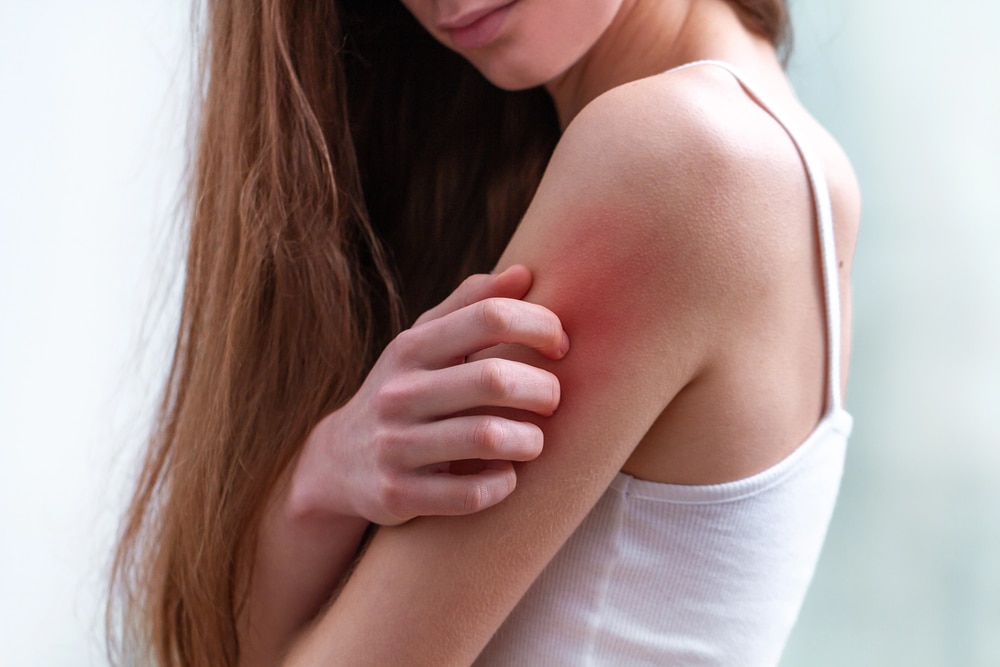If you’re experiencing unexplained patches of red, itchy skin, you’re likely eager to pinpoint the underlying cause of your discomfort and figure out how to relieve it. While many skin conditions can be characterized by itching and redness, psoriasis and ringworm are two of the most common, and at the Dermatology Institute and Laser Center, we frequently receive inquiries about how to distinguish one from the other.
Differentiating Ringworm From Psoriasis
Ringworm and psoriasis are not the same, but to the untrained eye, they can seem similar. Let’s take a closer look at the features that set these two skin conditions apart:
Similarities
- Both psoriasis and ringworm can cause itching, dryness, and redness of the skin.
- Both can show up almost anywhere on the body.
- Both can affect individuals of any age and background.
Differences
- Ringworm is caused by a fungal infection, while psoriasis is an autoimmune inflammatory condition that causes skin cells to multiply too rapidly.
- Ringworm commonly appears as a well-defined circular rash made up of one or more red rings with clear skin in the center. Psoriasis commonly appears as irregular patches of red, scaly skin known as plaques.
- Psoriasis is not contagious, while ringworm is highly contagious.
- Psoriasis is more common in adults, while ringworm is more common in children.
Causes Of Ringworm & Psoriasis
Psoriasis is an autoimmune disease that is thought to stem from a combination of genetic and environmental factors. Characterized by flare-ups of red, scaly skin patches that may itch, burn, flake, or bleed, it can be associated with certain medications, infections, smoking, alcohol consumption, and vitamin deficiencies, among other triggers.
Unlike psoriasis, ringworm stems from a fungal infection caused by a group of fungi known as tinea—which is also the clinical name for ringworm. It can affect various areas of the skin as well as the scalp, nails (fungal nail infection), groin (jock itch), or feet (athlete’s foot). Contrary to its name, ringworm is not associated with the presence of any worms or parasites.
Symptoms
Ringworm Symptoms
The symptoms of ringworm may vary depending on the specific fungal infection and its location on the body. They often include:
- A red, ring-shaped rash with clear or scaly skin in the center; there may be multiple rings that expand and/or overlap
- Itching
- Hair loss (if the scalp is affected)
Psoriasis Symptoms
The symptoms of psoriasis vary from person to person, and can even be different from flare-up to flare-up in the same individual. They often include:
- Red, scaly skin patches
- Itching, burning, bleeding, dry, flaking, peeling, or cracked skin
- Thickened skin
- Thickened/ridged nails
- Swollen, painful joints (psoriatic arthritis)
Symptom Recurrence
Psoriasis is a chronic skin condition and the symptoms of ringworm can also be recurring. It’s essential to seek medical attention if the symptoms of either condition are ongoing or unresponsive to a recommended course of treatment.
How To Diagnose Ringworm Or Psoriasis
Your doctor may be able to recognize ringworm or psoriasis simply by examining your skin and asking you about your symptoms, but a definitive diagnosis usually involves sending a skin sample to a lab for analysis.
Treatment & Prevention
Psoriasis treatments can include topical medications, oral medications, injectables, laser therapy, light therapy, and more. As triggers are identified, avoiding them is recommended.
Ringworm is treated with topical or oral antifungal medication, depending on the severity of the condition. Avoiding high-moisture environments and the sharing of clothing, towels, or personal items are good preventative measures.
Conclusion
Scheduling an appointment with a psoriasis doctor in New Jersey is the best way to diagnose and treat any skin issues you may be experiencing. For more information about psoriasis, ringworm, and other skin conditions that may have similar symptoms, book a consultation at the Dermatology Institute and Laser Center today!



